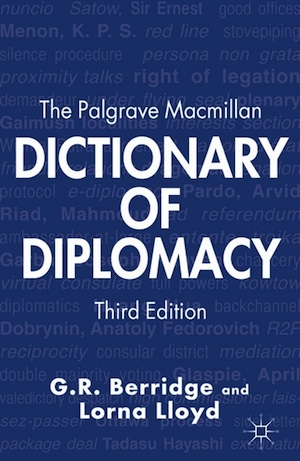The Palgrave Macmillan Dictionary of Diplomacy
Third edition
(Palgrave Macmillan: 2012)
G. R. Berridge and Lorna Lloyd
For this third and final edition of the Dictionary I was joined as co-author by Dr. Lorna Lloyd of the University of Keele in place of retiring Professor Alan James, although Alan made many valuable comments on various drafts. It is also much longer than previous editions and, thanks in large part to our expanded team of editorial consultants, draws its examples from more varied corners of the globe. But in one regard among others the Dictionary remains unchanged: it is still a work aimed at students of diplomacy (including historians of diplomacy) as well as at professional diplomats.
In revising the Dictionary we excluded numerous terms that seemed useful to diplomats but which were not part of the diplomatic lexicon strictly conceived. We also removed entries on which authoritative information had become more readily available on the internet, for example on international and regional organizations. For the same reason we also took out the text of the Vienna Convention on Diplomatic Relations (1961), which previously served as an appendix.
As to new entries, these include the large number of new terms that entered the lexicon during the first decade of the twenty-first century, among them those generated by the significant expansion of ‘e-diplomacy’; and many more, too, from the language of American diplomacy, which we hoped would assist interpretation of the vast archive of US diplomatic papers on the internet, added to by Wikileaks. They also include over twenty new biographical entries of outstanding diplomats from different countries. These not only serve as a reminder that diplomacy is not just a European phenomenon and add interest to the volume but also – by means of cross-referencing – illustrate very well some of the more arcane terms in the Dictionary. The net effect of these changes was to produce a work on the diplomatic lexicon which is at once somewhat tighter in focus and yet more comprehensive in its coverage.
Our ‘Editorial consultants’, who provided invaluable assistance to us, were three retired senior diplomats: Sir Brian Barder of the British Diplomatic Service, Laurence E. Pope of the U.S. Foreign Service and my DiploFoundation colleague, Kishan S. Rana, of the Indian Foreign Service. Sadly, Brian and Larry have since died and I have written their obituaries in links to their names in the previous sentence.
I cannot leave this introduction to the Dictionary without reproducing this clip from the Preface to the earlier editions: ‘It came as no surprise to us to learn (from another source) that during his distinguished diplomatic career [Sir Brian Barder] was himself the cause of the introduction of at least one new diplomatic term: the ‘bardergram’. Although we have never seen one, we … deduced the following definition as our token of appreciation to him:
bardergram. An ambassadorial *telegram which is at once robust and graceful. The bardergram, which may be pithy in expression and passionate in tone, is not always short and is usually fired in salvos. It ends typically with the following statement: ‘I await your homicidal riposte.’
The Springer Link page on the Dictionary is well wort visiting.
Reviews
From Diplomacy & Statecraft, vol. 24(1), 2013
… The first and second editions were much slimmer volumes, and, as befits this potentially wider readership the new edition is much larger and more inclusive than its predecessors yet at the same time remains tightly focused. Drawing on a range of distinguished historians and practitioners of diplomacy in the modern period, the new edition adopts a much less Britain and European centred focus with entries reflecting recent developments and significant writers, thinkers and practitioners in the diplomatic field on a global basis, from the ancient world to the present.
… The new edition’s strengths rest in its understanding of the new players in the diplomatic field … . Also notable is the inclusion of emerging states and their contribution to diplomatic development, with, amongst others, references to South American, African, and Asian statesmen and diplomats. Women diplomats too are recognised. Major treaties affecting diplomatic practice are described in detail as well as significant and precedent making treaties. Reflecting current concerns in international law and the legality of state action, the Dictionary includes references to a number of international legal terms and acts, their significance and their current status as accepted and binding law in the international community. The new edition of the Dictionary is also strong on that all-important aspect of diplomacy—communication. … . Nor is record keeping forgotten; the archives of the foreign ministries receive due attention, and the distinction of “diplomatics” and diplomacy is recognised.
The new edition is both comprehensive and clearly written, particularly in relation to the more complex and nuanced aspects of legal diplomatic practice, but also has refreshingly arcane and occasionally mischievous touches. … Occasionally more precision in the historical entries would have helped to make the entries more specific and there are very occasional problems with the cross referencing, but these are all minor points and do not detract from a work which will continue to be the standard reference source. … Louise Atherton, University of East Anglia
For Italian readers, see also Rita Corsetti, in Rivista di Studi Politici Internazionali, Nuova Serie, vol. 80(3), 2013



